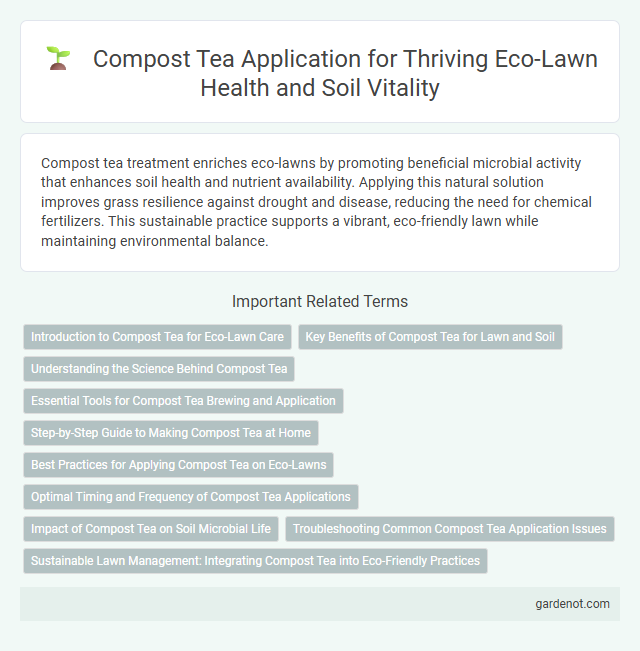Compost tea treatment enriches eco-lawns by promoting beneficial microbial activity that enhances soil health and nutrient availability. Applying this natural solution improves grass resilience against drought and disease, reducing the need for chemical fertilizers. This sustainable practice supports a vibrant, eco-friendly lawn while maintaining environmental balance.
Introduction to Compost Tea for Eco-Lawn Care
Compost tea is a nutrient-rich, microbial solution brewed from compost to enhance soil health and promote robust growth in eco-lawn care. This natural treatment introduces beneficial microorganisms that improve soil structure, increase nutrient availability, and enhance turf resilience against pests and diseases. Applying compost tea regularly supports sustainable lawn maintenance by reducing the need for chemical fertilizers and fostering a healthy, vibrant ecosystem.
Key Benefits of Compost Tea for Lawn and Soil
Compost tea treatment enhances lawn health by delivering beneficial microbes that improve soil structure and nutrient availability. This natural solution boosts microbial diversity, aiding in disease suppression and promoting robust root growth. As a result, lawns exhibit increased drought resistance, vibrant green color, and reduced dependency on chemical fertilizers.
Understanding the Science Behind Compost Tea
Compost tea treatment harnesses beneficial microorganisms extracted from compost to enhance soil health and promote robust lawn growth. The science behind compost tea involves aerating water with compost to cultivate populations of bacteria, fungi, and protozoa that suppress pathogens and improve nutrient availability. This microbial-rich solution acts as a biofertilizer and biocontrol agent, fostering an eco-friendly, sustainable approach to lawn care.
Essential Tools for Compost Tea Brewing and Application
Essential tools for compost tea brewing include an aerated brewer with a 5-gallon capacity, an aquarium air pump, and high-quality compost rich in microbial diversity. A fine mesh bag or strainer is crucial to separate solids from the liquid, ensuring a nutrient-dense, pathogen-free tea for eco-lawn application. Proper application tools, such as a backpack sprayer or watering can, enable even distribution of compost tea, promoting soil health and enhancing grass growth naturally.
Step-by-Step Guide to Making Compost Tea at Home
To create nutrient-rich compost tea at home, start by filling a five-gallon bucket with dechlorinated water and allowing it to sit for 24 hours. Add one cup of mature compost, a tablespoon of unsulfured molasses, and an aquarium air pump to oxygenate the mixture, promoting beneficial microbial growth. Brew the tea for 24 to 48 hours, stirring occasionally, then strain and apply it immediately to your eco-lawn for improved soil health and natural pest resistance.
Best Practices for Applying Compost Tea on Eco-Lawns
Applying compost tea on eco-lawns enhances soil microbial activity and nutrient availability, promoting resilient turf growth. Use aerated compost tea made from quality compost, and apply it during early morning or late afternoon to optimize uptake and minimize evaporation. Maintain consistent application every 2-4 weeks during the growing season for best results and avoid overwatering to preserve microbial populations.
Optimal Timing and Frequency of Compost Tea Applications
Applying compost tea to eco-lawns during early spring and late fall enhances soil microbial activity and nutrient availability. Optimal frequency involves treatments every 2 to 4 weeks during the growing season to sustain beneficial microorganisms and promote healthy turf growth. Avoid over-application to prevent nutrient imbalance and potential microbial suppression.
Impact of Compost Tea on Soil Microbial Life
Compost tea treatment significantly enhances soil microbial diversity and activity, promoting beneficial bacteria and fungi essential for nutrient cycling and plant health. This enriched microbial life improves soil structure, increases nutrient availability, and suppresses harmful pathogens. Studies show that regular application of compost tea leads to a thriving, balanced soil ecosystem that supports sustainable lawn growth.
Troubleshooting Common Compost Tea Application Issues
Compost tea treatment may face common issues such as uneven application, unpleasant odors, and poor microbial activity. To troubleshoot, ensure proper aeration during brewing, maintain the correct tea concentration, and apply immediately after brewing to preserve microbial viability. Monitoring pH levels and using quality organic inputs can enhance effectiveness and prevent problems.
Sustainable Lawn Management: Integrating Compost Tea into Eco-Friendly Practices
Compost tea treatment enhances soil microbial activity, promoting nutrient cycling and improving turf resilience in sustainable lawn management. This eco-friendly approach reduces the need for synthetic fertilizers and pesticides by naturally suppressing pathogens and supporting healthy grass growth. Integrating compost tea into lawn care practices aligns with environmental goals, conserving water and minimizing chemical runoff while maintaining lush, durable lawns.
Compost tea treatment Infographic

 gardenot.com
gardenot.com